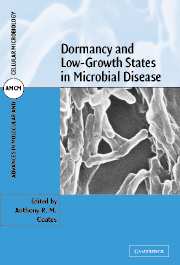Book contents
- Frontmatter
- Contents
- Contributors
- Preface
- 1 Physiological and molecular aspects of growth, non-growth, culturability and viability in bacteria
- 2 Survival of environmental and host-associated stress
- 3 Surviving the immune response: an immunologist's perspective
- 4 Quantitative and qualitative changes in bacterial activity controlled by interbacterial signalling
- 5 Mechanisms of stationary-phase mutagenesis in bacteria and their relevance to antibiotic resistance
- 6 Biofilms, dormancy and resistance
- 7 Tuberculosis
- 8 Gastritis and peptic ulceration
- 9 Resumption of yeast cell proliferation from stationary phase
- 10 Resting state in seeds of higher plants: dormancy, persistence and resilience to abiotic and biotic stresses
- Index
- Plate section
Preface
Published online by Cambridge University Press: 18 August 2009
- Frontmatter
- Contents
- Contributors
- Preface
- 1 Physiological and molecular aspects of growth, non-growth, culturability and viability in bacteria
- 2 Survival of environmental and host-associated stress
- 3 Surviving the immune response: an immunologist's perspective
- 4 Quantitative and qualitative changes in bacterial activity controlled by interbacterial signalling
- 5 Mechanisms of stationary-phase mutagenesis in bacteria and their relevance to antibiotic resistance
- 6 Biofilms, dormancy and resistance
- 7 Tuberculosis
- 8 Gastritis and peptic ulceration
- 9 Resumption of yeast cell proliferation from stationary phase
- 10 Resting state in seeds of higher plants: dormancy, persistence and resilience to abiotic and biotic stresses
- Index
- Plate section
Summary
All cellular life forms can exist in multiplying, non-multiplying, and slowly multiplying states. In the case of bacteria, slowing of growth is associated with tolerance to a wide range of stresses, such as heat, cold, and antibiotics. This makes sense because organisms multiply only when the conditions are beneficial, and when not multiplying, the organism concentrates on survival in the face of environmental threats.
Many different species of microorganisms live in or on humans. Most are harmless or even beneficial. A few are pathogens. Persistence in a slowly multiplying or non-multiplying form is very common. In some situations, slow multiplication is the dominant phase for bacteria. This book addresses the basic scientific aspects of microbial dormancy and low-growth states and places them in the context of human medicine. An introduction to aspects of growth, non-growth, culturability, and viability is provided in Chapter 1. In the next chapter, the crucial relationship of low-growth states with survival of stress is discussed, with detail on the molecular mechanisms which are involved in the stress response. Chapter 3 sets the scenario for survival of the immune response, and many examples are provided of low-growth states that are associated with different survival mechanisms in animals and in humans. The next two chapters deal with interbacterial signalling in dormancy and mutations in stationary phase, respectively. These are two relatively new areas of study, which are becoming increasingly important. Chapter 6 describes biofilms and their relationship to dormancy and antibiotic resistance.
Information
- Type
- Chapter
- Information
- Dormancy and Low Growth States in Microbial Disease , pp. xiii - xivPublisher: Cambridge University PressPrint publication year: 2003
